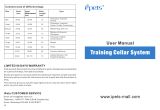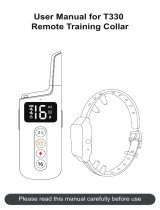
Changing the Intensity Level
You can select a different intensity level for each dog collar
device.
1
Select a dog collar device (Selecting a Dog Collar Device).
2
Select or to increase or decrease the intensity level.
The numerical intensity level appears on the LCD display.
Basic Training Commands
You should begin training your dog with a few basic commands
without using the Delta Upland training system to correct the
dog. You should train the three basic commands in the following
order: "heel," "sit," and "here."
During initial training, you should put the dog collar device on
the dog, but the device should be turned off. This allows the dog
to get used to the device before you start using it to correct the
dog. This also helps to prevent "collar-wise" behavior
(Preventing Collar-Wise Behavior).
Initially, you should keep the training sessions short and only
train one command during a session. This way, the dog is less
likely to become confused and training should progress more
quickly. Pay close attention while training the dog, so you can
begin to learn when to go faster or slower, and when to take a
break.
With plenty of repetition, consistency, patience, and a lot of
praise, the dog should begin to obey these commands after
several lessons. Each dog learns at a different rate, and some
dogs may take longer to learn these commands. After the dog
demonstrates a basic understanding of these commands while
on a leash, training with collar stimulations can be introduced,
while keeping the dog on the leash.
Training to Heel
Before you begin training, put a leash on the dog, and select an
area with minimal distractions.
The first command that you will teach the dog is the “heel”
command.
1
With the dog at your side on a leash, command the dog to
“heel,” and begin walking forward while gently pulling on the
leash.
2
If the dog gets in front of you, repeat the command “heel,”
and move in another direction or pull back on the leash.
3
If the dog starts to lag behind you, lightly tug on the leash to
bring the dog back to your side.
Reward the dog with praise when the dog obeys the command.
Training to Sit and Stay
Before you begin training, put a leash on the dog, and select an
area with minimal distractions. Before you train to sit and stay,
you should first train to heel.
The actual command is “sit,” and the “stay” command is implied.
When you command the dog to sit, the dog should stay until you
indicate otherwise.
1
Begin training this command walking the dog on a leash in
the heel position.
2
Stop walking, pull up on the leash, and command the dog to
"sit."
3
Maintain steady pressure on the leash until the dog obeys
the command.
4
If the dog does not obey and seems confused, gently push
down on the dog's back above the flank, to make the dog sit.
Reward the dog with praise when the dog sits and stays.
Training to Come Here
Before you begin training, put a leash on the dog, and select an
area with minimal distractions. Before you begin training the dog
to come "here," you should first train the dog to "heel" and "sit."
Also, you may need to use a long leash to effectively train
"here."
Teaching your dog to come here is the most important
command. The "here" command allows you to maintain control
of your dog and can be used to call your dog away from a
potentially dangerous situation. This command must be taught
properly.
1
With the dog in a sitting position, move away to the end of
the leash.
2
Command the dog to come “here” while gently tugging on
the leash.
3
Reward the dog with praise as soon as the dog begins to
move toward you.
4
If the dog begins to veer away, gently tug on the leash, and
repeat the command to come "here."
The dog might resist this command. With repetition and
patience, the dog will learn to obey the command.
Collar Training
Begin training your dog on a leash, without using the Delta
Upland training system. After the dog shows a grasp of the
commands "heel," "sit," and "here," you can begin training with
the collar and the leash.
During the initial stage of collar introduction, the dog learns that
collar stimulation means the same thing as a tug on the leash.
At first, the dog may be alarmed by the electronic stimulation.
The key is to be patient and consistent and not to start off at too
high of an intensity. Be fair and consistent, and use repetition
and praise when using the collar as a training tool.
If the dog does not respond to the stimulation level you have
selected (Choosing the Correct Intensity Level), increase the
stimulation one level at a time until you achieve the appropriate
response. After you achieve the desired response, you can
lower the stimulation level as long as the dog maintains
consistency.
As the dog becomes more proficient with the commands, you
can begin to introduce distractions, such as rolling a ball in front
of the dog or walking him in the presence of others.
After the dog begins to respond consistently to the command
during collar training, you can remove the leash and train with
just the collar.
NOTE: You should train without a leash only when it is
appropriate for your environment and your dog's temperament.
You should follow all laws and regulations for your area
regarding the use of dog leashes.
Eventually in most training situations, your commands will not
require stimulation to be given with the command. You should
only use stimulation when you need to repeat a command
because the dog did not obey the first one.
As the dog becomes better trained, you can decrease the use of
collar training. Continue to have the dog wear the collar until
you feel certain that it is no longer needed to reinforce known
commands. Abandoning the collar too early can lead to
problems in the future.
Preventing Collar-Wise Behavior
If the Delta Upland training system is not used properly as part
of your overall training program, the dog may exhibit "collar-
wise" behavior. This occurs when the dog obeys commands
while wearing the dog collar device, but does not obey
commands when the device is removed. You should follow
these tips to prevent this behavior.
• Begin training the dog without using the Delta Upland
training system to correct the dog (Basic Training
Commands).
• Turn off the dog collar device and put it on the dog during
initial training.
Dog Training 5

















